
DJC.COM
April 24, 2008
Boomers influence next generation of senior housing
Rice Fergus Miller

Force
|

Jones
|
Change is the only constant. People and events throughout history have been the triggers that bring forth these changes.
These waves of great change can be linked to specific generational groups, each with their own characteristics, values, viewpoints, goals and desires. These groups are known as the traditionalists, born 1908-1946; the baby boomers, born 1946-1964; Generation X, born 1965-1980; and the millennials, born 1981-1999.
The health care industry has been impacted by two of these generations in recent years. As images of stark nursing facility rooms are pushed out, they are being replaced with visions of a home — a community where life can be lived to the fullest.
These communities are becoming more and more popular as the baby boomer generation strives for places they one day want to call home and feel comfortable watching their traditionalist parents move into. This new wave has transformed the old-fashioned nursing home into new senior living communities where emphasis is placed on sustainability, choices are welcomed and life is experienced to the fullest.
Older baby boomers who are nearing retirement are thinking more about their futures, and many are also assisting their traditionalist parents in the task of selecting a senior living community. With few options, they have begun to voice their concerns.
Sustainable community
Research has indicated a need for a different approach. In 2002, Rice Fergus Miller teamed with senior-housing developer Life Care Services of Des Moines, Iowa, to build a state-of-the-art senior-living community in Issaquah called Timber Ridge at Talus. Its first residents moved in last month.

Images courtesy of Rice Fergus Miller Timber Ridge at Talus has several dining options, including a formal dining room, a cocktail lounge and a cafe with takeout. |
One of the goals in building Timber Ridge was to optimize the use of sustainable materials and resources and decrease the impact on the environment.
These attributes are important to traditionalists who grew up amidst two world wars and the economic depression. During these times, “waste not” was not just a slogan, but a way of life. For ecology-minded baby boomers, who started recycling and pioneered environmentally friendly products, sustainability and building green just makes good sense.
Timber Ridge embodies these ideas through the use of natural light, low-volume plumbing fixtures, biodegradable housekeeping products and low volatile organic compound-emitting materials such as carpet, paint and adhesives.
The large, open landscape features native plants that do not require heavy watering or synthetic fertilizers. In addition to these features, all scrap building materials were recycled.
With the completion of the first development phase, Timber Ridge is expected to achieve LEED silver certification.
Keeping options open
Traditionalists and baby boomers seek choices. They want to take an active part in deciding their futures. To facilitate this task, extensive focus groups and interviews are conducted to determine the residents’ personal preferences and health needs.
Apartment-style floor plans are offered along with the security of an on-site health center, where assisted living, memory care and skilled nursing is available.
There are a variety of dining options, including a formal dining room with three different seating areas, a cocktail lounge and cafe area with takeaway meals offered. There are multiple places and opportunities for residents to socialize and be active and involved in the community.
These features were designed with traditionalists and baby boomers in mind. Traditionalists don’t want to be told what to do. They want the freedom and flexibility to decide their daily routines.
Baby boomers want the same things, as they do not perceive themselves as getting old. Instead, they are redirecting their time and pursuing hobbies they never had time for during their success-driven careers. They want to maintain their influence and continue making valuable contributions to society.
A ‘healthy living center’
Traditionalists view retirement as a long-awaited destination. They feel they have worked hard and made sacrifices for their family, career and country. Some traditionalists believe that retirement is for exploration, discovery and enjoyment of the simple pleasures in life that they didn’t have time for while working.
In contrast, baby boomers do not see retirement as a time to slow down. They are still ambitious and have high hopes for great achievements in their retirement years.
Timber Ridge was designed with the different generational viewpoints toward retirement in mind to ensure that the residents’ desire for value and opportunity has been met.
Design elements follow a Northwest theme, including a water feature, hand-crafted tiles and a fireside terrace with panoramic views of Issaquah and the surrounding countryside.
Timber Ridge also operates an on-site “healthy living center” that offers tai chi, a reflexology path, indoor and outdoor yoga, massages, a hairdresser and other spa services.
The community also offers a putting green, walking paths, biking, lawn croquet, bocce, and exercise and aerobic rooms. A pool and whirlpool spa addition are scheduled for the next phase of development. There is also a library, art and woodworking studio, personal gardening spaces and lounge areas for games.
Change is inevitable. Generations past and present will therefore continue to influence trends in society. Interest in preserving our resources, protecting our planet, increasing our choices and enjoying a high quality of life will become the foundation for building future senior-living communities.
Magen Force is the marketing coordinator and Karen Jones is a lead interior designer at Rice Fergus Miller, a Bremerton architecture and planning firm.
Other Stories:
- Boomers lifting standards for patient care
- Architects play key role on health care team
- How BIM helped a hospital go green
- Time to improve hospital energy standards
- Innovative structures help hospitals cut costs
- For patients, silence is golden
Copyright ©2009 Seattle Daily Journal and DJC.COM.
Comments? Questions? Contact us.